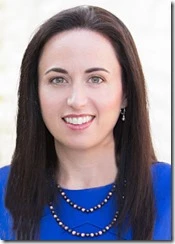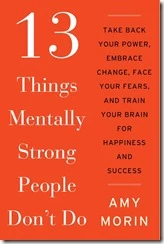 SWTP is proud to join in the chorus announcing the publication of 13 Things Mentally Strong People Don't Do by Amy Morin, LCSW. If you've taken SWTP practice exams, then you're already familiar with Amy's work--she helped write large portions of SWTP's first practice exams. Now that she's a published author, she's agreed to answer a few questions about the book and how she came to write it.
SWTP is proud to join in the chorus announcing the publication of 13 Things Mentally Strong People Don't Do by Amy Morin, LCSW. If you've taken SWTP practice exams, then you're already familiar with Amy's work--she helped write large portions of SWTP's first practice exams. Now that she's a published author, she's agreed to answer a few questions about the book and how she came to write it.
What's your background? What drew you to social work?
Initially, I set out to be a doctor. But it only took a few days as a pre-med student, to realize medicine wasn't my true passion. I was much more interested in the mind, rather than the body. I wasn't sure whether to major in psychology or social work, but I fell in love with social work after my first few classes.
I went to graduate school right after getting my bachelor's degree because I wanted to work as a psychotherapist. Over the years, I've worked in schools, community health settings, hospitals, and a primary care office. A few years ago, I also began teaching college classes, which I also love.
How did you make the transition from exam-item writer to book author?
Writing started out as somewhat of a hobby for me, but over the years my writing income grew into a part-time job. In addition to writing exam questions, I began freelancing for websites like About.com.
Last year, I wrote an article called "13 Things Mentally Strong People Don't Do" and it quickly went viral. It attracted millions of page views before being picked up by Forbes, where it's been read almost 10 million times! The attention that article received led to lots of new opportunities ranging from national TV appearances to speaking engagements. All that attention also led to a call from a literary agent encouraging me to write a book. With her help, I put together a book proposal and got a book deal with HarperCollins.
How did you arrive at the 13 things?
The list was actually a letter to myself as I faced an incredibly tough circumstance. In 2003, my mother had passed away. Then, on the three-year anniversary of her death, my husband died. Both of them passed away in very unexpected and sudden circumstances and throughout my grief, I certainly learned a lot about mental strength.
Then, last year, my father-in-law was diagnosed with terminal cancer. Unlike my two previous losses, this time I knew what was coming. I wrote the list as a reminder to myself about the things I needed to avoid doing if I wanted to stay strong as I faced the end of my father-in-law's life.
The list is based on the same skills I'd worked with clients on over the years. It was just the first time I'd ever written them all down in one place. I found it helpful to see a list of all the common pitfalls that could hold me back and I shared it online in hopes it could help other people too. I had no idea it would resonate with so many other people but avoiding those 13 common pitfalls can help with all of life's challenges, big or small.
 Just like physical muscles need training, building mental muscle also requires hard work and exercise. Showing people how to avoid common pitfalls that could hold them back in life and teaching them exercises to build mental strength could help address issues ranging from weight loss to depression reduction. I also think using the mental strength approach is helpful in reducing much of the stigma that is associated with mental illness. I'd love to see 13 Things Mentally Strong People Don't Do become a tool that social workers use regularly with clients.
Just like physical muscles need training, building mental muscle also requires hard work and exercise. Showing people how to avoid common pitfalls that could hold them back in life and teaching them exercises to build mental strength could help address issues ranging from weight loss to depression reduction. I also think using the mental strength approach is helpful in reducing much of the stigma that is associated with mental illness. I'd love to see 13 Things Mentally Strong People Don't Do become a tool that social workers use regularly with clients.
Since this is SWTP, how might the 13 things help people preparing for the social work licensing exam?
A couple of ways: First, it's based on a variety of therapy skills, including CBT, REBT, and DBT--all of which can serve as helpful reminder to anyone taking the exam. On a more practical level, the book can help someone who may be feeling anxious about taking the exam. We know that the the way we approach challenges, think about failure, and respond to mistakes are just a few of the things that can determine our ability to succeed. For example, people who feels anxious about the exam may struggle to recall information because they're distracted by their anxious thoughts and feelings.
Preparation is key to passing the exam. Becoming familiar with the way questions are worded and the types of questions that will be asked can go a long way to decreasing test day anxiety. The book is filled with strategies for building mental strength and tips for managing thoughts, regulating emotions, and behaving productively, something any test-taker can use!
Thanks, Amy, and congratulations!
Order 13 Things Mentally Strong People Don't Do on Amazon today and help it become a bestseller before it even hits shelves (December 23rd).
Happy reading, happy holidays, and good luck on the exam!

 SWTP is proud to join in the chorus announcing the publication of
SWTP is proud to join in the chorus announcing the publication of 